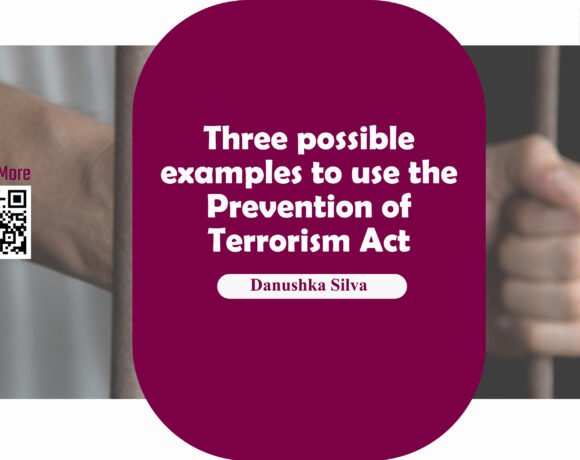
A Constitution for Reconciliation
Aruna Lakshman Fernando
Sri Lanka is now free from the civil war that was dragging for decades. Many structural changes were required to avoid the recurrence of such a humanitarian catastrophe. Constitutional reform that addresses the issues is one of them. However, the Mahinda Rajapaksa regime did not focus on such a constitutional reform from 2009 until his defeat at the presidential election in 2015. At least a draft was not compiled.
Constitutional reform is one of the foremost promises of the Good Governance government that came to power in 2015. A committee was appointed under Lal Wijenayake for public consultation on a new constitution. However, the process did not proceed until a new constitution was drafted. The present government has also appointed a committee chaired by President’s Counsel Romesh Silva for public consultation. Among the proposals submitted to the committee, one set forth by Ven. Omare Kassapa Thero demands the name of the country be changed to Sinhale or Sinhala Nation. It cannot be a personal move but a representation from a society that does not accept that Sri Lanka is a multinational country.
Renaming a country in a recognised way like a constitutional reform is no problem. British Ceylon under colonial rule became an independent Ceylon, and Sri Lanka was declared by the 1972 republic constitution. However, the proposal to rename Sri Lanka as Sinhale and divide the sub-national units as Ruhunu, Maya and Pihiti, as mentioned in history, is a threat to national unity. The reason is that the proposal, although it appears innocently nostalgic, underprops motives of suppressing minority communities and breaking the constitutional rights they already enjoy.
Sinhale is a familiar name for us. In Martin Wickramasinghe’s Gamperaliya novel, Jinadasa goes to Sinhale in search of work. Then Uva Province was Sinhale. Renaming Sri Lanka as Sinhale is different from that experience. Sinhale is a chauvinist nomenclature that might excite racists who would like to subdue ethnic minorities in an entirely Sinhala dominated state. However, the move will frustrate Tamil, Muslim, Malay, Burgher and other minority communities. They will feel like outsiders in this state. Therefore, the change of Sri Lanka’s name as Sinhale will accompany long term damage to ethnic reconciliation.
One can argue that this is a proposal of one section, and it is a mere suggestion. However, we cannot underestimate it because this kind of proposal is dangerous in a society where the leaders admit the multicultural status of the state before the international community while promoting Sinhala Buddhist racism to gain votes at elections within.
This proposal is connected with other moves like proposing to use the flags hoisted when the British colonised the country and sing the national anthem only in the Sinhala language at national festivals. A Sinhala only national anthem is already in use, and it will indeed be included in a future draft constitution. If these elements are successful in changing Sri Lanka’s name as Sinhale, it will surely be the start of another catastrophe. Such an end is not easy to reverse.
The aim of the proposal to change the sub-national units as Ruhunu, Maya and Pihiti is to change demographic proportions and grab the few political powers the minority communities enjoy in the Northern and Eastern Provincial Councils. Thus, they will be effectively denied access to the decision making process.
Minorities hold power in the Northern and Eastern Provincial Councils, while Central Province minorities have considerable representation. Under the Ruhunu, Maya, Pihiti system, the entire Northern Province, Trincomalee district of the Eastern Province and a part of the North-Western Province will come under the Pihiti subnational unit. The Tamils in the north will effectively be made a minority again in this provincial unit too. They will lose the majority powers they presently hold in the Northern Provincial Council. The Muslim and Tamil minorities in the Eastern Province will also face a similar situation. This will severely harm ethnic reconciliation and will lead to an elongated ethnic conflict.
A constitution is the foundation of all sorts of laws, administrations and functions of a state. People must enjoy the privilege of submitting proposals at the public consultations on constitutional reforms. However, such opportunities must be used wisely, and the proposals must not lead the dialogue into unnecessary zones. Ultimately, it might affect the democratic process of compiling a constitution. The foundation of a new constitution for Sri Lanka must be reconciliation and understanding between the ethnic communities. Any constitution that ignores these basic needs might not take Sri Lankan society an inch forward. A new constitution must not be mere extensions of the 1972 and 1978 constitutions. The new constitution must safeguard human rights and dignity while improving quality of life by uniting all the divided communities into one governing structure.
நல்லிணக்கத்தை ஏற்படுத்துவதற்கான அரசியல் யாப்பு








